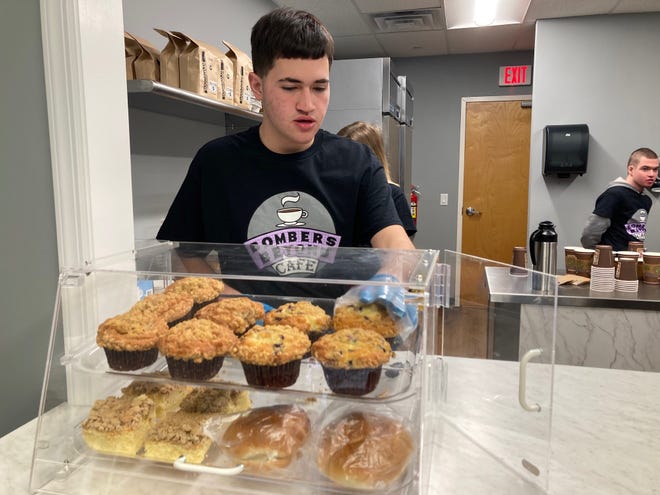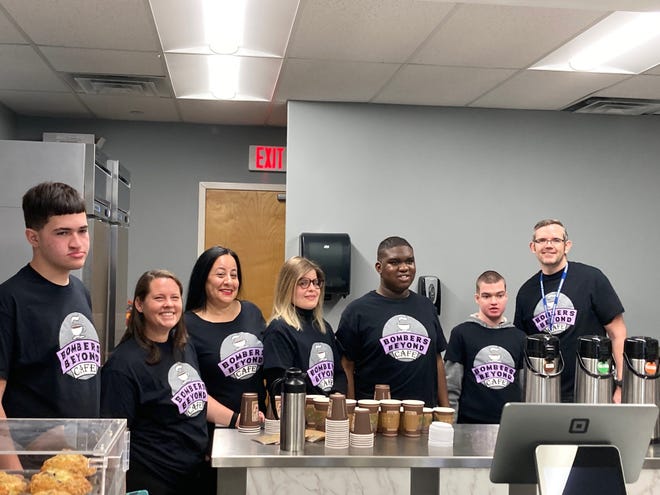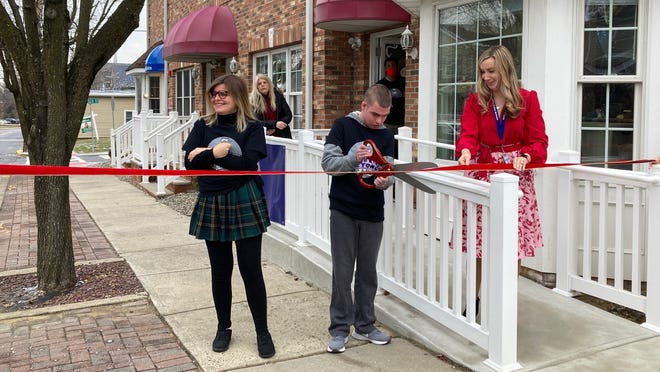[ad_1]

SAYREVILLE – “One coffee and a blueberry muffin, please,” one of the first customers at Bombers Beyond Café said to members of the Brew Crew.
“What size, small or large?” said Gary, 19, while Jayvon, also 19, carefully used tongs to pick up the muffin. “And is that for here or to go?”
Professional and proud.
The long-awaited student-run Bombers Beyond Café at 132 Main St. opened with smiles and a ceremonial ribbon-cutting in late winter. As customers and VIPs came inside for the first time, Samuel, 19, was greeting everyone with a loud and hearty, “Welcome to the Bombers Beyond Café.”
“I begin the day by brewing the coffee and stocking the café for the opening,” Jayvon said. “I learned how to measure coffee grounds and work the machine.”

After a five-year wait − from conception to birth − the school district officially has its own special education transitions program in place for students aging out of school.
Bombers Beyond is kicking off with five students − Emme, 19, Gabriel, 21, Samuel, Jayvon and Gary. There are two full-time teachers − Andrew Vanderbeck and Caileigh Fazzini − and one paraprofessional − Christine Falcone − dedicated to the project, which bridges the gap between school and adulthood.
“I am just beyond thrilled,” said Superintendent of Schools Richard R. Labbe. “I can tell you how incredible I felt when I walked through that door and saw what had been done in transforming this from what it was to now, a café. And then to see our students in their Bombers Beyond Café t-shirts, serving − literally brought tears to my eyes. They are making an impact.”
Students receive applicable authentic work-life lessons as they provide a service to the community. Considered by the state Department of Education as an extension of the high school, the students’ day mirrors the school day − from 7:30 p.m. to 2:14 p.m. The Bombers Beyond Café is open 8 a.m. to noon on school days. All work shifts in the shop. The afternoons are spent in instruction and other experiences.
“Everybody learns all the jobs and they switch off,” said Cynthia DeFina, supervisor of Secondary Special Education. “They are learning job readiness, social skills, job-specific and independence skills. They’re really a great bunch of students. I could not have asked for a more perfect class to kick off this program.”
Director of Special Services David Knaster said the inspiration for the program lay in an unexpected moment about eight years ago at a Unified Sports basketball game at the middle school. A Unified Sports game allows students of all abilities to participate together.
“So I’m watching the game, and a parent is standing next to me, and she’s looking forward as well,” Knaster said. “And I hear her say to me, ‘Thank you for making me feel like a real mom.’ So I turned to her, and said ‘What do you mean?’ And she said, ‘I never thought that my child would be allowed to play ball on this court.'”
That one innocuous comment stuck to Knaster.
New Jersey students with disabilities are entitled to remain in school through the age of 21. Then, they age out and many go on to attend additional programming. But, while the borough is “very inclusive,” Knaster said, there was nothing for them in their own community − and nothing to broaden their horizons at “home.”
“There are a variety of really nice programs, but we didn’t have anything here in town for our kids,” Knaster said. “Our initial thought was, it’s great that our kids go to other programs, but they’re experiencing those communities, not their own community. And when they age out of 21, they return home often with nothing real beyond adult services to access − there’s no employment, no jobs. Our concept was started to keep our students within their own community with the latest research-based programming and offer paid employment as their life skill training. That was our vision.”
Initially the program was to be housed in Jesse Selover School on Lincoln Avenue. As plans and needs changed, the Selover School makeover became a preschool and the Bombers Beyond program began looking for another location. Then came the pandemic.
The new location on Main Street was even better. Knaster said he always envisioned a “small-town Main Street” feel for the program.
Knaster also credits the teaching staff with getting the program off the ground.
“They are tireless in their enthusiasm and passion for this program. But not just the for the café,” he said. “That’s important. That’s the public face of what we do. But they are expert instructors. With a great knowledge and wealth of curriculum.”
While the program is debuting with five students, the administrators expect it to grow. This program is not the answer for every student’s needs, but Knaster said it is a significant asset for a good number of the district’s special needs students.
Vanderbeck and Fazzini are already pleased with their students’ progress, and pleased with the opportunities given to them by the community.
“We are proud that Sayreville has provided our students with the opportunity to be inclusive in our own community,” Vanderbeck said. “This is an amazing opportunity to be able to help shape such a wonderful program for years to come.”
“As a lifelong Sayreville resident, I am not surprised that our community has welcomed this program with open arms,” Fazzini said. “Every member we have encountered has been generous, kind, and supportive. I’ve never been more proud to be a Sayreville resident.”

Besides the storefront, the district also leased an apartment upstairs. The apartment will be used to train students − young adults − on how to live independently, Knaster said. There is a kitchen, bathroom, lounge space, two rooms for lessons and laundry area.
“We’re going to give our children real world work experience and real word living experience,” he said. “And they’re making friends with new people and establishing relationships. That’s really perhaps the most valuable thing we’ll take from here as we prepare our young adults for post high school life.”
Rose Addo and Samuel Kissi Sr. have already seen a difference in their 19-year-old son Samuel Kissi Jr.
“I see him having more of a social life with friends and family around him,” she said. “It’s improving his communication skills, his socialization and self-esteem.”
Tara Callahan Rodriguez, mother of Garbiel Rodriguez, is grateful for the program − it allows her son to stay within his home community − and with people he knows.
“I just think it’s amazing,” Rodriguez said. “My son’s been in the program since he’s 3 years old. He’s now aging out. He is learning everything from how to brew and pour coffee, take an order, clean, prep and handle money. He loves it.”
This is just a beginning. Knaster said.
“Maybe, we’ll have somebody working in a garden center down the street, or in one of the other shops,” he said. “Something that’s of high interest for that student. We have choices and they should have choices. We’ll have the avenues to do that as well. Plus, we will do travel training, like on the NJ Transit access link, how to use the bank, post office − anything that you would need to do to maximize your independence within your own community. And the key for us here is it’s in their town.”
email: cmakin@gannettnj.com
Cheryl Makin is an award-winning features and education reporter forMyCentralJersey.com, part of the USA Today Network. Contact: Cmakin@gannettnj.com or@CherylMakin. To get unlimited access, please subscribe or activate your digital account today.
[ad_2]
Source_link


